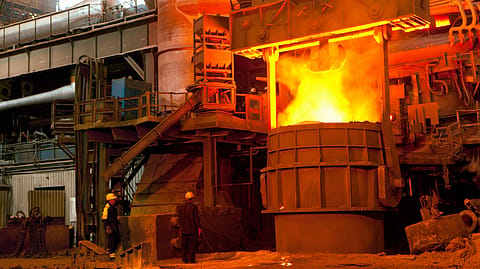Indian chemical companies gave maximum shareholder returns between 2020 and 2024
Annual total shareholder return (TSR) of 28% compared to 7% globally

While the global chemical industry is going through turbulent times and causing value erosion, the Indian chemical companies are performing well in recent years, driven by strong domestic demand, policy support, and healthier valuation dynamics, according to a study on global chemicals value creation.
India’s chemicals industry led the world in value creation, delivering a five-year average annual total shareholder return (TSR) of 28%, compared with 7% globally between 2020 and 2024, says Boston Consulting Group’s 'Value Creation in Chemicals' report, based on an analysis of 322 leading publicly listed chemical companies worldwide.
The global chemical industry's growth was a modest 3.4% in 2024 and 0.3% in 2023. The industry is expected to recover this year, with projections for production to increase by around 3.5% in 2025. In contrast, the overall Compound Annual Growth Rate (CAGR) of the Indian chemical industry was around 9% in the last decade. It is projected to continue growing at approximately 10% CAGR to reach about USD 383 billion by 2030, according to various estimates.
''India's performance is driven by revenue and profit growth as well as higher P/E multiples, supported by strong domestic demand. While the potential for continued growth is evident, the next phase of advancement will be defined by how Indian companies choose to scale over the next five years, whether by strengthening existing value chains or by venturing into new ones," says Amit Gandhi, Managing Director & Senior Partner, BCG India.
Average annual TSR for chemicals globally was 7% (2020–2024), constrained by soft demand, overcapacity, and cost pressures. In contrast, India outperformed with a 28% five-year TSR, supported by resilient domestic demand, policy reforms, and a record increase in valuation multiples. Indian companies in Focused Specialities (33% TSR) and Fertilisers (32% TSR) significantly outperformed. India’s export engine was particularly strong in Agrochemicals and Focused Specialities (such as pharma ingredients, personal care, and engineered materials), while fertilisers were driven almost entirely by domestic consumption, says the report.
Conversely, other emerging markets—including the Middle East, ASEAN, and Latin America—destroyed shareholder value, as a result of soft demand and overcapacity. So did the UK and Western Europe, although companies in these regions also felt the effects of high energy costs and a high regulatory burden. Five-year TSR in the European multispecialty sector was –4%, while base chemicals and basic plastics based in emerging markets saw a TSR of –2%, due in part to the effects of overcapacity in China. Except for ASEAN (which delivered TSR of –4%), Asia continues to be a leading driver of shareholder value creation for the global chemical industry. Four of the five countries with above-average TSR from 2020 to 2024 were from Asia: India, China, and the Northeast Asian countries of South Korea and Japan.
India’s chemicals outperformance was driven by resilient domestic demand, targeted policy support, and improved investor sentiment that lifted valuation multiples. The sector’s performance reflected a combination of strong home-market demand and a strong share of exports in Agrochemicals and in Focused Specialities such as Pharma Ingredients, Personal Care, and Engineered/High-Performance Materials, while Fertilisers remained largely a domestic play, says the report.